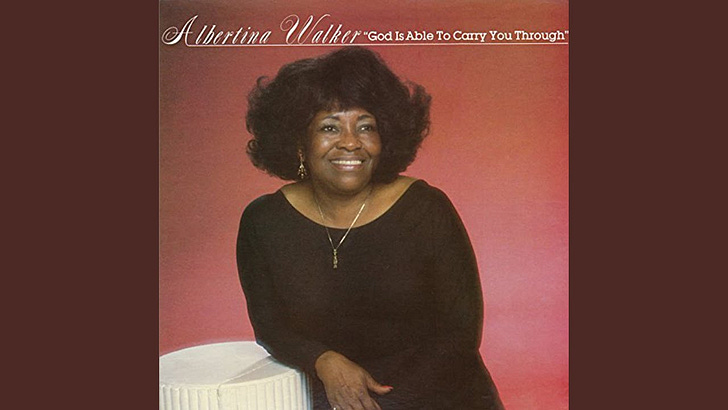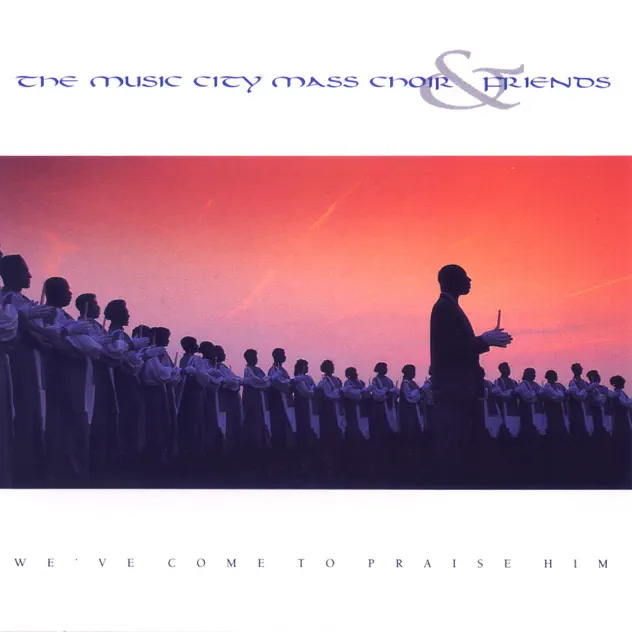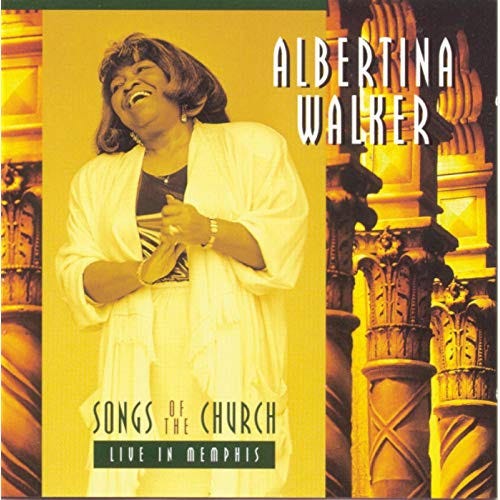Turning Thirty: Albertina Walker & the Music City Mass Choir
In the last newsletter of 2024, I revisit two albums from 1994 that feature contributions from the late Derrick Lee.
Music City Mass Choir—We’ve Come To Praise Him—New Haven Records
On the heels of their Grammy nomination for their 1992 debut, Never Let Go of His Hand, the Music City Mass Choir returned in 1994 with a power-packed sophomore project, We’ve Come to Praise Him.
Where their debut had focused around Lawrence Thomison, a Nashville-based singer/preacher who’d first come to national prominence in the 70s as part of Dewitt Johnson’s Johnson Ensemble, We’ve Come to Praise Him took a different approach. Combining known soloists like Bob Bailey and Beverly Crawford with strong voices from the choir’s interior, producer Derrick Lee presents a strong representation of the breadth of talent situated in Nashville and its surrounding areas in the early 90s.
Lee’s production leaned on the players he’d been utilizing in his work with Bobby Jones and New Life. Lee handled keyboards with the brilliant Ralph Lofton on organ, Jim Long on guitar, Micah Mabson on bass and Terry Baker on drums, delivering a cohesive, fiery musical padding undergirding this dynamic choir.
The choir’s soloists shine on “Thank God for Saving Me” (led by Toya Risby), “Strengthen Me” (led by Leah Knox), and “He Lifted Me” (led by Jackie Jerkins), each brilliantly bringing a traditional feel to Lee’s contemporary arrangements.
The guest vocalists bring the heat as well. New Life Singers alumni Stephania Stone Frierson blazes through the album’s title track, while Bob Bailey delivers a vocal masterclass on the Geoffery Thurman-Michael English composition “No More Pain.” Beverly Crawford conducts a twelve-minute revival on Armirris Palmore’s “We Need to Hear from You,” starting with a whisper and ending with a wail on this unsung gem from her body of work. Lawrence Thomison shines on “It’s Yours for the Asking,” a quartet-inspired romp that reminds listeners exactly why they fell in love with Music City Mass Choir back in 1992.
1994, however, was the peak of the choir phenomenon and with a market that had become flooded with choir albums, We’ve Come to Praise Him, despite its excellence, got lost in the fray. It was also, sadly, the last release by the Music City Mass Choir, but an important document chronicling the innovative space that Nashville held in the innovation of the contemporary choir movement of the time.
Albertina Walker—Songs of the Church—Benson Records
After forty years of touring and performing, no one would have blamed Albertina Walker for resting on her laurels. Not only was she responsible for introducing the world to talents like Shirley Caesar, James Cleveland, Cassietta George, Inez Andrews and Loleatta Holloway through her legendary group, The Caravans, but she’d had an entire second chapter as a solo artist which resulted in some of gospel’s biggest hits of the late 70s and early 80s, like “Please Be Patient With Me” and “I Can Go To God In Prayer.”
While her reputation as “The Starmaker” endured, it was Dr. Bobby Jones who utilized his television show to brand her The Queen of Gospel, reminding gospel lovers of just how significant her contributions had been. While her reputation grew, her recordings had started to wane in terms of their success. She signed with Word Records and released 1986’s Spirit (produced by Thomas Cain) and 1989’s My Time Is Not Over (produced by Sanchez Harley), both of which had varying degrees of the right elements to make hits, but neither of the albums, both of which were Grammy-nominated, completely gelled. She signed with The Benson Company in 1989 and released two more albums, You Believed In Me (produced by Cain and Harley) and 1992’s Live (produced solely by Harley) that also failed to produce the kinds of hits she’d generated just a decade earlier.
What those albums made clear was that her tastes were broader than the kinds of songs she’d had hits with. While she was certainly a traditional gospel artist who loved that music deeply, she also clearly loved ballads with introspective lyrics and an adult contemporary leaning. This had always been the case though, dating back to her last recordings with The Caravans in the early 70s when she adapted songs like “White Cliffs of Dover” and “The Impossible Dream.” During her tenure at Savoy, she slid these ballads into her repertoire (the still-underrated Robert Fryson ballad “I Won’t Last A Day Without You” and “The Best Is Yet to Come” are prime examples). While the Cain and Harley productions may have been a representation of Walker’s capabilities, they were out of step with what gospel listeners were looking for.
1993’s He Keeps On Blessing Me, however, turned the tide. Walker herself co-produced the album with Harley and Bobby Jones and New Life’s musical director, Derrick Lee. Peppered with a collaboration with Ricky Dillard’s New Generation Chorale, the album gathered compositions by great writers like Calvin Bridges (who’d written “I Can Go To God In Prayer”), Babbie Mason, Calvin Bernard Rhone as well as Derrick Lee and Walker herself. Former Caravan Dorothy Norwood wrote the album’s breakout single and title track, completing an album that turned out to be the most balanced and energetic solo studio album of Walker’s career. On the heels of the album’s Grammy-nomination, Walker, Harley and Lee sojourned to Memphis (with the same cast of musicians as the Music City Mass Choir recording sans Jim Long on guitar) to record Walker live.
In collaboration with O’landa Draper & The Memphis Community Choir, Walker built on the synergy that He Keeps on Blessing Me had initiated, landing on eight songs that were either gospel standards or songs from her own catalog that hadn’t quite gotten the attention she felt they deserved. She told Billboard’s Lisa Collins at the time, “I got the chance to do a lot of familiar hymns. And when I say church songs, I mean the old hymns like ‘Oh Lord, Remember Me.’ Songs I’ve sung all of my life.”
Songs of the Church does, indeed, play like a service. The album’s opener, “Don’t Let Nobody Turn You Around” (an improved take on the arrangement she’d recorded on 1986’s Spirit), sets the tone for a triumphant and spirited voyage through a range of gospel’s varied sounds. “When God Dips His Love In My Heart,” for example, was written by Cleavant Derricks in 1944 and became a standard in both the black and southern gospel tradition, recorded by the Blackwood Brothers, Martha Carson, Hank Williams by the mid-50s (and Walker herself in 1984). Walker’s version brings these two gospel sounds together. Also from the southern gospel tradition, she covers J.B. Coats’ “Where Could I Go (But to the Lord).” Similarly, she adapts “I’m Going on With Jesus Just the Same,” a song with quartet roots, recorded by everyone from The Sensational Nightingales to the Crabb Family, and rescripts it to “I’m Going on With Jesus Anyhow,” slowing it down to a near gospel-blues, making room for herself, Dorothy Norwood and Shirley Caesar to testify. Walker’s protégé John McNeil is featured on the hymn, “In The Garden,” and another of Walker’s mentees, Faith Howard, also has a solo on the album’s most contemporary selection, “God Is Not Finished With You.”
But the album’s most central moments lie in a modern hymn and one of Walker’s ballads. The first, “Oh Lord, Remember Me,” is another from the southern gospel tradition, written by E.M. Bartlett, a writer of ‘convention songs’ (including “Just a Little While,” popularized in gospel circles by The Caravans’ Cassietta George) and dozens of songs that would become modern hymns like “Everybody Will Happy Over There” and “Victory in Jesus.” Walker’s take on “Oh Lord, Remember Me,” builds slowly with Walker’s deliberate, behind the beat phrasing drawing all attention to the story she is telling, with Draper’s choral arrangement pushing Walker as the song culminates to a dramatic close that overtakes not only the audience, but Walker herself.
The album’s second most essential moment comes in the form of “Joy Will Come” one of the aforementioned adult contemporary ballads Walker had recorded for 1989’s My Time Is Not Over. Walker’s relationship with the song had clearly changed from that first recording, because to compare the two versions is to hear two very different readings. The studio version from 1989 has none of the signature Walker-isms that signal that she has inhabited a song. On the 1994 reading, however, she’s completely comfortable, taking her time and invested in making the song an experience. I got to witness Walker preview this arrangement prior to the album’s release at Bobby Jones Youth Explosion in the summer of 1994 and it was evident that this was going to be one her signature songs…and it was.
Songs of the Church earned Walker the only Grammy Award of her career and would mark the beginning of the end of her career as a recording artist. She recorded two more solo albums, ending this chapter of her career with 1997’s I’m Still Here and a final full length reunion with The Caravans in 2006 with the Grammy-nominated and aptly titled Paved the Way.
Listen to Songs of the Church here.
2024 In Review
The Land of Hope and Dreams: Thoughts on 49 Years of Music
This Thursday, I will turn 49 years old. First of all, in so many aspects of my life, I feel like I’m still the 24 year old kid who showed up to Nashville with no real plan, other than to get here and make my way. But I’m not 24 anymore and I’m much more mournful of the world’s condition than I ever anticipated I would be by the time I reached this age…
Setting The Intention: Part Four
This past Friday, I was driving home and took a chance and called one of my oldest friends. Joann was the first adult friend I made completely on my own when I was twelve years old or so. She was the music buyer at our local Christian bookstore and one of the first people I developed a friendship without the aid of a church or school connection.









Albertina is blowing me away! Thank you Tim for showing us how and who to hear and see!